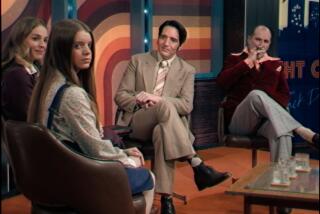Toying With Words--and Truth
- Share via
Television is working great changes in our language. Not only has it added many technical words, such as television itself, it has added to the meanings of old words, such as anchor.
The greatest damage, it seems to me, occurs in television advertising, which, like all advertising, can play havoc with the rules.
The ads for the BMW motorcar, for example, don’t call the product a car at all or even an automobile. It is called a driving machine . My dictionary (the American Heritage College Dictionary) does not list driving machine as a synonym for automobile, nor automobile as a synonym for machine.
Not only is it called a driving machine in the ads, it is called “the ultimate driving machine.” The gentleman who speaks these words has a cultivated accent, not quite British, but perhaps a BMW accent. It is pretentious enough to deliver the word ultimate without embarrassment.
This same gentleman (not to single the fellow out) also pronounces the word luxurious (which BMW ads naturally require him to use) as lug-zhurious, a pronunciation that is favored by many other TV people.
I must note, however, that my dictionary also gives the first pronunciation as lug-zhurious and the second as luk-shoor-ious . Is it possible that the TV pronunciation has edged out the luk pronunciation?
I am gratified to find, however, that the Oxford English Dictionary, which is pure, cites the luk pronunciation first.
With the flood of TV ads for Caribbean cruises, the old pronunciation of Car-ib-e-an has been scrapped. I listen in vain to hear that pronunciation, and now and then I am rewarded. It is occasionally pronounced correctly by somebody who has been there, but in commercials it is invariably Ca-rib-e-an , rather than the older Car-ib-e-an , which includes the name of the Carib people.
That is rather a picayunish complaint, I concede, and probably doesn’t bother anybody but me.
It is odd that in this nuclear age, few professionals (TV spielers) can pronounce the word nuclear . Usually they say nucular . Even a President has made that mistake.
Again, I suppose it doesn’t really matter. But I worry that there’s anything about nuclear physics that we don’t understand, or even know how to pronounce.
Of course advertising has always toyed with the truth. One of the most common tricks of print and radio advertising was “two for the one price.” That is meant to suggest that you get two garments, or whatever, for the price of one. Of course it does not say that. You get two garments for the one price, which may be three times their worth.
Then there’s the 99 ploy. The advertisers say that their garment is only $4.99. I have found that few shoppers really understand that 99s is 99 one-hundredths of a dollar. In other words, if you pay that dollar you get a penny back.
My mother used to be a sucker for the 99 ploy. Asked what she had paid for something she would say, “Oh, it was only something 99.” The 99 was predominant in her mind. It stood for the whole amount. I don’t suggest that my mother was stupid. She was shrewd indeed. But she liked to kid herself. Or perhaps she was kidding my father.
I have even seen the 99 come-on used for very expensive items. For example, a car may be advertised as costing only $24,629.99. That’s $24,630 with a penny back.
I wonder what my mother did with all those pennies she saved.
Some of the current TV ads for new cars are almost unbelievable. One by one they ask you to consider the savings you may make by buying their product.
You don’t have to make any payment before Feb. 1, 1996. Interest is only 1.7%. You get $500 cash back. You don’t have to pay for servicing for a year.
The fact is, who can afford not to buy a car?
My wife recently gave her old Maxima to the Red Cross. She had driven it into the ground. Meanwhile, she is driving my Honda, which I can no longer drive. I keep trying to get her to buy a new car because of all the money she can save, but she isn’t convinced.
Meanwhile, have you noticed that movies aren’t called movies any longer? They’re not even called motion pictures, which was pretentious enough. They’re now called motion-picture events . Especially if they cost a lot of money. What was the matter with movies ?
It was good enough for Jimmy Stewart and Olivia de Havilland, and it’s good enough for me.
More to Read
The complete guide to home viewing
Get Screen Gab for everything about the TV shows and streaming movies everyone’s talking about.
You may occasionally receive promotional content from the Los Angeles Times.






